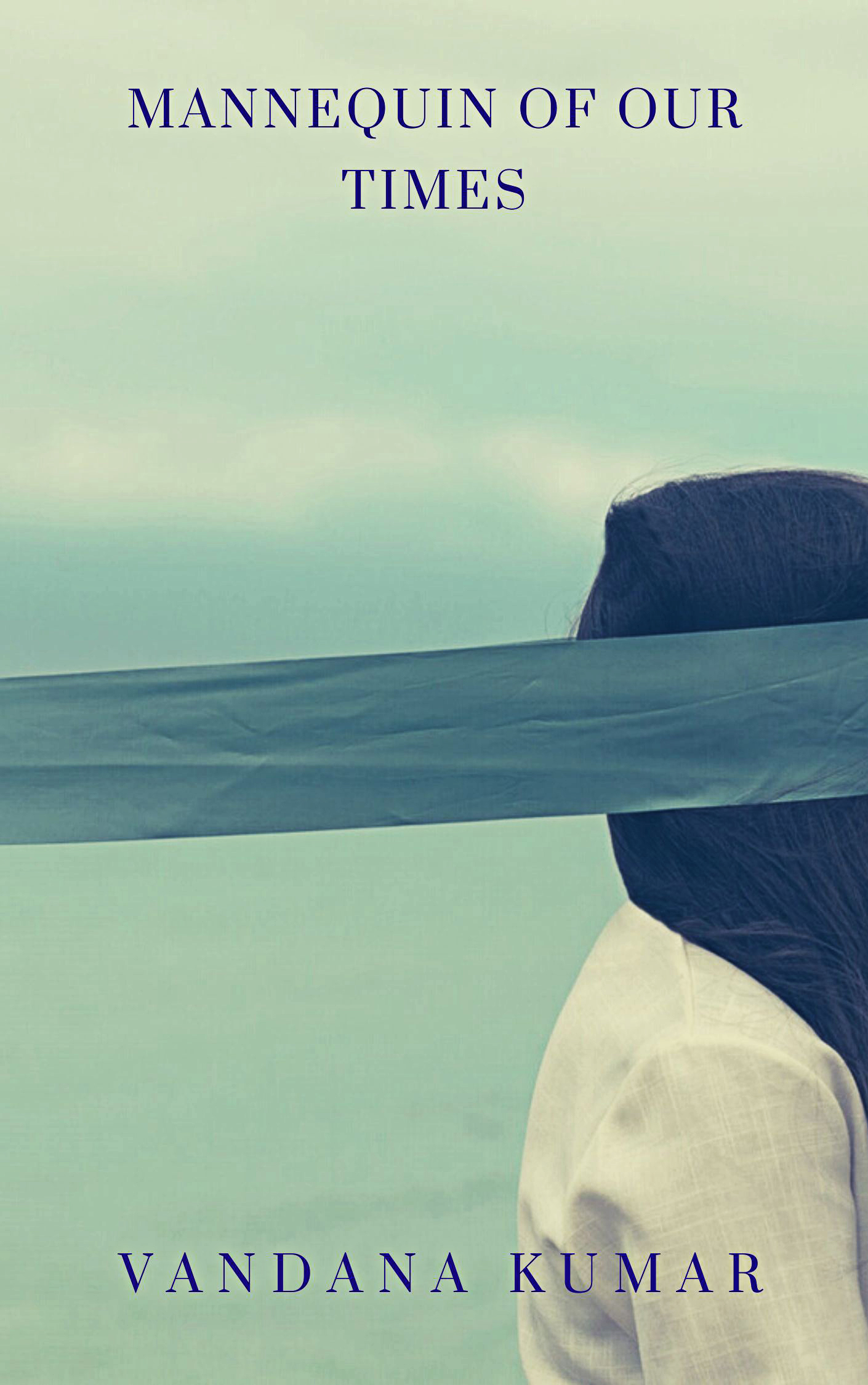Published February 19th, 2024
Review
by Ana Bojanović
Mannequin of Our Times (2023) by Vandana Kumar is characterized by an exceptional lightness of expression, bordering on levity, in the background of which often reside serious themes and poignant insights. The title of this book is reminiscent of the realist era, in which writers and poets aspired to bear witness to their times and convey a realistic presentation of what surrounded them. However, the meaning of this collection goes far beyond mere realistic testimony. This seeming contradiction contributes to its modernism and even postmodernity. The poet has achieved her stated intention: This collection of poetry is deeply immersed in the present moment and its myriad manifestations, depicted in an unbiased and somewhat distant manner. Simultaneously, it illuminates universal truths that transcend the boundaries of time, resonating with relevance across all eras.
With its landscapes and poetic imagery, Mannequin of Our Times is a deeply urban collection of poetry. It is intensely atmospheric; objective and subjective realities mingle to the point of being indiscernible. Its basic atmosphere is a quiet melancholy, often bordering on poignancy. Kumar’s poetry boldly enumerates the modern achievements of contemporary society, its temples which the poet’s contemporaries gladly and generously visit in order to commune with each other, but often remain with a floating feeling of loneliness and unfulfilled purpose nevertheless. These people, loaded with numerous obligations and tasks that contemporary life requires from them, somehow lose sight of the reason they do it all.
“life
as a passenger of a train
and outside the timetable
of the station
when night falls
the waiting rooms darken
the lights are off –
and for that fleeting second
even the busiest junction
has that moment
no train
just lonely track.”
(from “The last train home”)
Those modern shrines such as supermarkets, shopping malls, speed-of-light railways, busy streets, conglomerates, or social networks (and the virtual plain) are but momentary distractions from the meaninglessness of eternal transience immanent to everything. This is one of the directions of this book, eternal transience:
“trace all the art galleries
from antiquity
and brush strokes that today need
censor certificates
Search your checklist in shirt pocket
and things to do
and sticky notes
that made colourful reminders
to books you don't visit any more”.
(from “Sun in my eyes”)
As with time, love is not idealized either. It is depicted in sometimes prosaic, or even mundane situations, where passion has long bid farewell. First encounters promise the world but deliver much less. Quiet evenings of lovers who are so used to each other that they don’t even notice each other anymore. Love, with its ebbs and flows, is an uneven current, perhaps an unfinished journey.
“I miss you in the evening silence
or noiseless storms that pass us by
only to meet you again
in the book I devour at night
in the space between two love stories
one where we meet
one where, we can never unite.”
(from “To meet again”)
An eternal change taking place within the hearts of two people who search for each other and sometimes miss even noticing each other. Even love is seen through the spectrum of irony, as a temporary distraction, but is an attempt worth trying, and beautiful with all its sensuous and spiritual aspirations:
“Oh, lovers like yourself
and myself
give this world your tenets
of nothing else but love
of religion, it has been whispered:
„even Gods don't believe in Gods“.”
(from “Under the moonlight”)
One of the questions that arise frequently is the ecological consciousness of today’s humanity, not so much within a scientific realm, but as an attempt to deal with or predict the future of our home planet:
“Who will inherit the earth?
Now that someone lit a match
Now that its forests are on fire.”
(from "Who shall inherit the earth?”)
This deep questioning evident in this collection of poetry is not paired with shallow and unfounded optimism, nor is there an imperative of positive thinking seemingly imposed on us in New Age popular psychology. Instead, it is accompanied by heavy forebodings twisted into irony and sometimes even satire.

The Pandemic reflections chapter deals not only with societal consequences of this gigantic threat that befell humanity, but also depicts the inherent process of subjective alienation that took place within each of us. It portrays the process of alienation from our old selves, our outdated worldviews where everything seemed safe and secure, even facing our mortality as a mere statistical fact:
“Have you ever felt?
Strangely distant from yourself?
From each and every part
of your anatomy?”
[...]
“And you talk clinically
about liver and intestines
dispassionate about water in the lungs…”
(from “Outsider”)
Vandana Kumar is an engaging writer, but she employs an understated and subtle writing style. She conveys her social critique through a myriad of highly subtle descriptions, leaving the reader to arrive at their own judgements and conclusions. The society she depicts in a dystopian key in this collection of poetry is infested with indifference and alienation among humans. They have become deprived of the basic and evolutionary needed human trait of empathy and the will to help those closest to them.
“Hadn’t society
distanced itself already?
From the cries for help
from the neighbor at 3 am
hadn’t we washed off?”
(from “Outsider”)
The poetic subject is deeply aware of interpersonal alienation and the lack of defiance or proactivity within a contemporary society, leading to agreeableness that results in a sense of numbness. These phenomena were present long before the onset of the pandemic, which seems to have arrived as a conclusive event to what has already been going on for some time:
“The noise of defiance
and angst
has left the place
the nights are moist
with boredom…”
[...]
“This isn't a place anymore
where rebellion grows under the nails
like a garden
Where a new strange bird
sits on a windowsill...
One that you keep admiring…”
(from “Nothing happens”)
There is a tacit critique of the existing collective tradition and feelings of uncertainty and ambiguity that are so modernist in Kumar’s collection. “Metapoetry” (poetry that talks about itself) serves as the propulsion toward postmodernism, blurring the lines between fiction and reality.
A notable trait of this collection is its unpretentious repertoire of poetic images. These snapshots of our everyday modern life are filled with objects, situations, and even food we consume, which we frequently encounter on a daily basis. Kumar is adept at weaving threads of eternal meaning through mundane and somewhat bizarre situations, infusing her poetry with a certain magical quality:
“I look for a pizza cutter
and ice cream scoop
I imagine making triangles
out of the dense fog
and consuming it
to make visible spaces in the atmosphere…”
(from “A still winter”)
Here we witness how everyday picturesque scenes transform into almost surreal imagery, acquiring a completely new quality. They are transformed by the poet’s vivid and often dissecting imagination, which ultimately serves as a filter to dive into a higher, eventually different and more meaningful reality.

The lyrical subject of Kumar’s poetry frequently speaks with the voice of a woman. Femininity is, in fact, the central theme of the entire chapter The Cyclone Has a Gender. This chapter explores the position of women in Indian society and tradition, delving into their immersion in it and emergence from it. It also raises formerly taboo topics, such as libido, male-female intimate relations, sexual intercourse, genitals, and even feminine medical procedures.
“I wonder what it smells like
to the gynecologist today?
As it continues its life
outside of my body
I fear the time
when the vagina will die
and I
continue to live.”
(from “Random thoughts on a vagina”)
In doing so, this collection of poetry creates its own postmodern revolution in the realm of topics. The lyrical subject speaks of a woman as both a social and biological being who can never completely overcome its roots, despite alleged furious and unstoppable social development:
“Let us
two earthly bodies
join
after we polished off
the nectar
and drunk all the wine…”
(from “Let us”)
Kumar’s poetry serves indeed as a testimony of a specific moment in time, as indicated by its title. However, it also possesses a universal and timeless beauty, due to its exploration of the universal laws governing this world. These laws remain intact despite the current vicissitudes of circumstances. The collection addresses the transiency of time, the fragility of human promises and aspirations, and the inevitable decay that eventually truncates everything. Ultimately, Kumar’s poetry emphasizes the unity of humankind and its shared destiny, transcending all differences, whether imposed or inherent:
“The family had lost friends and foes alike
similitude in the cause of death
nothing would distinguish them now
on the other side…”
(from “Summer of more grief”)
Despite the often gloomy landscapes of the modern world, shaken by the pandemic and inherent alienation, this poetry is not pessimistic in its vocation or message. Hope shines through, offering a glimpse of light within the darkness:
“So many babies were conceived
in a year you want to erase
the history of grief
is too old
to have started this year
and too young
to end with it.”
(from “2020 – the year that was(n’t)”)
In this way, the poetic subject maintains a universal perspective, envisioning the contemporary historical moment as nothing more than a segment on a vast and immeasurable chronological scale. This imbues this collection with deep philosophical, even spiritual qualities.
The longing for summer, liberation, lost unity, and the purpose of joie de vivre prevails throughout this poetry, at least as an aspiration, alongside continuous movement and travel, as if by constantly relocating, one tries to keep up with the passage of time and perhaps, in some way, also defeat it. The gaze of the poetic subject often turns upward, toward the primordial power of the sun, representing both the Creator and life’s vital force and its celestial background. Perhaps that is where we should seek answers, indeed.
Nationality: Serbian
First Language(s): Serbian
Second Language(s):
English,
Italian
Supported by:

